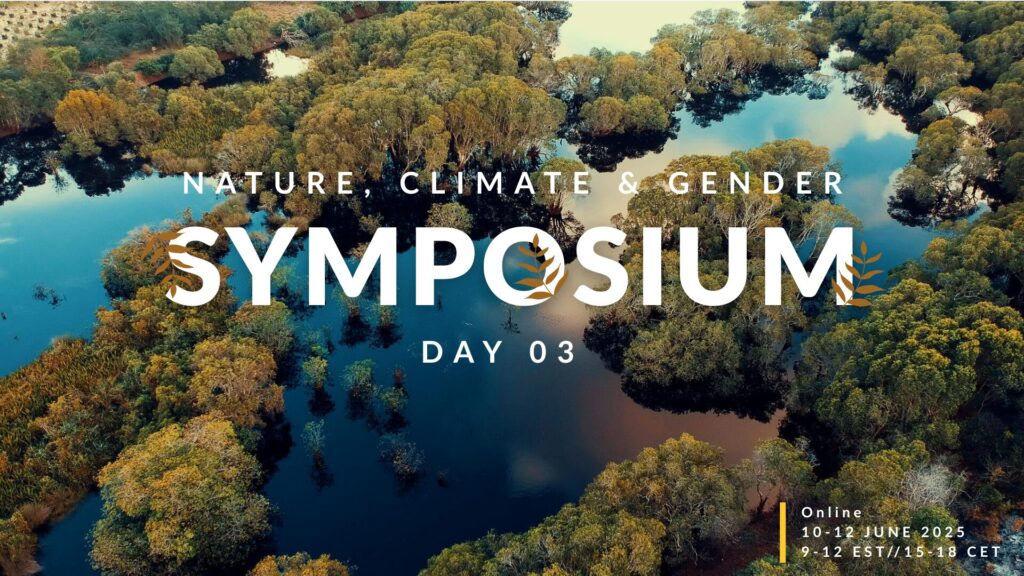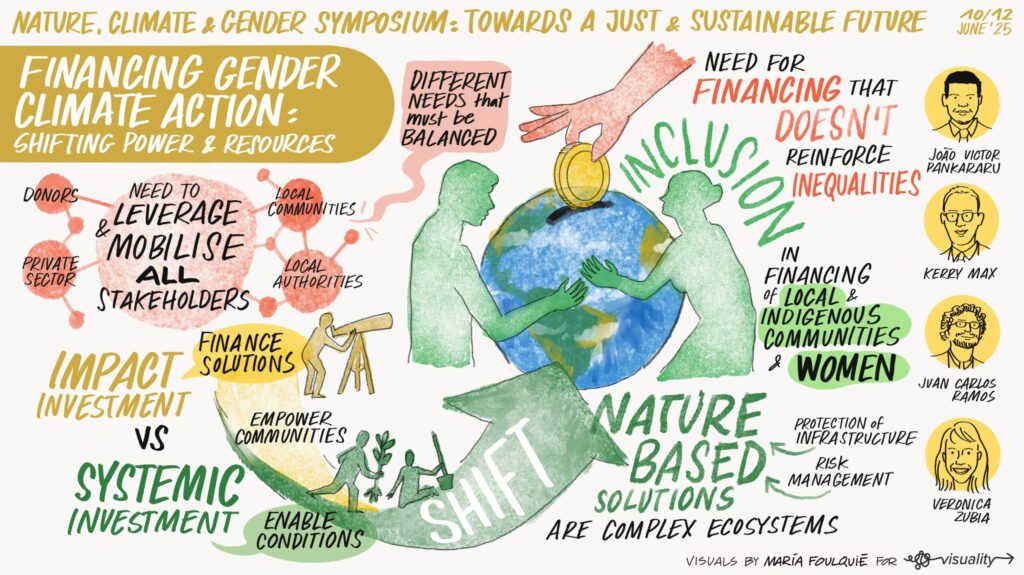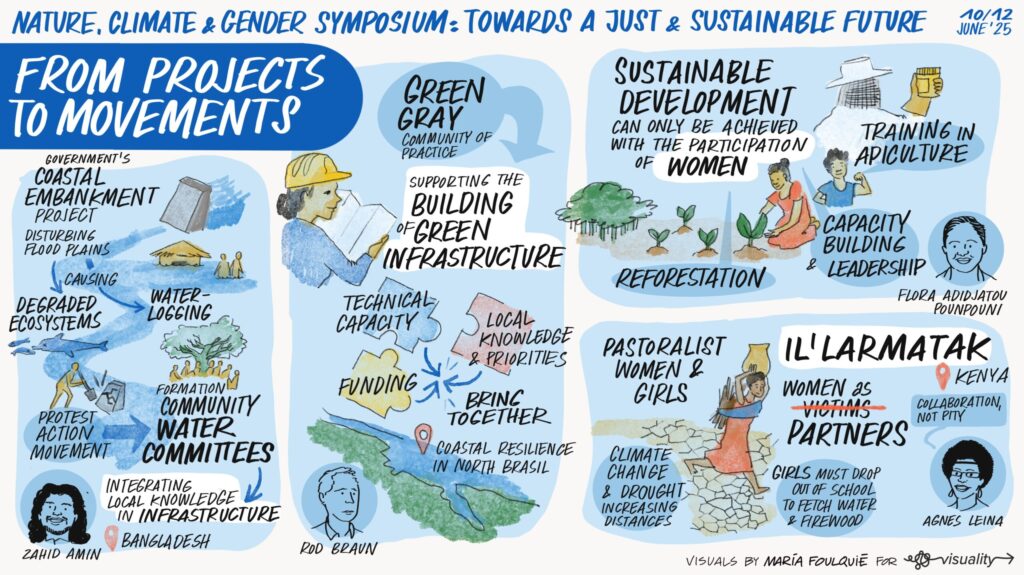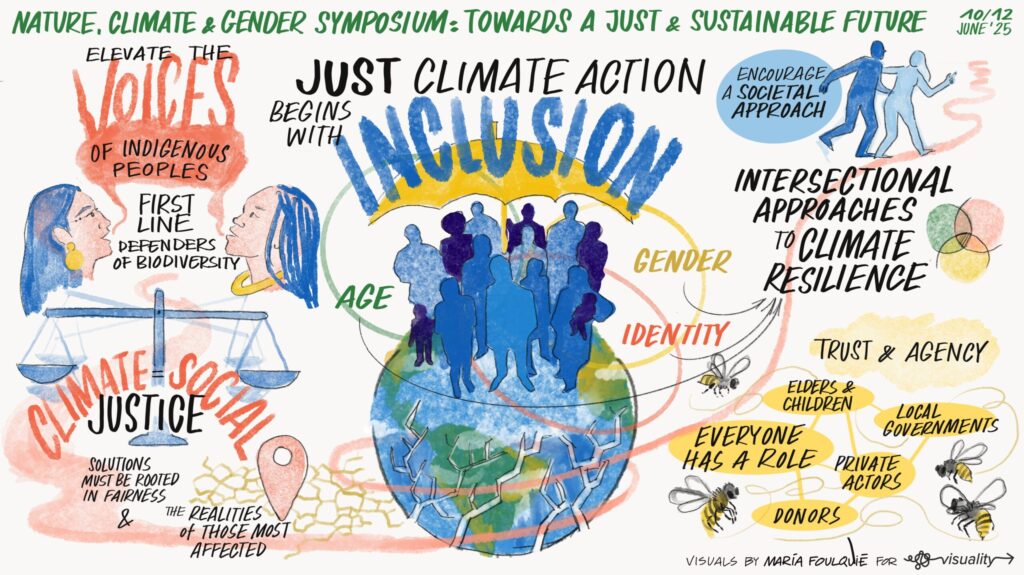Nature, Climate, and Gender Symposium Day 3: Building Movements and Future Pathways

Session 5: Financing Gender Climate Action – Shifting Power and Resources
Speakers:
- Ali Raza Rizvi (IUCN)
- Kerry Max (Global Affairs Canada)
- Juan Carlos Ramos (EcoAgriculture)
- Veronica Zubia (UNEP Finance Initiative)
The fifth session explored the structural barriers and opportunities in climate finance, highlighting how funding systems must evolve to support inclusive, lasting impact. One of the key points was the complexity of aligning diverse priorities—from donors and private investors to governments and communities. While local communities often have clear, grounded visions for climate resilience, donor agendas and funding priorities tend to shift, sometimes driven by biodiversity concerns, trade interests, or domestic political goals. Private sector actors, on the other hand, seek returns that can be difficult to reconcile with the slower timelines needed for inclusive, community-based change.
To address this, speakers stressed the importance of focusing not only on outcomes but also on the processes that enable long-term results. Successful initiatives need to manage the inherent tensions between differing timelines—those of communities, donors, and the private sector—and ensure that no group’s pace undermines another’s progress.
A compelling case was made for a systemic approach to finance. Instead of targeting isolated sectors or single-point interventions, landscape-level strategies were recommended. These approaches acknowledge the interconnectedness of agriculture, conservation, infrastructure, and social governance. Such strategies require deliberate investments in enabling conditions like local governance structures, partnerships, and long-term planning.
Speakers also underlined the ongoing exclusion of Indigenous Peoples, women, and local communities from direct access to climate finance, even though these groups play a critical role in biodiversity protection and climate adaptation. Key recommendations included adopting rights-based approaches, simplifying financial processes, safeguarding environmental defenders, and recognizing the full value of traditional knowledge and lived experience. Making space for community leadership in decision-making is not just ethically necessary—it is essential for real impact.
This shift in focus requires a new way of measuring success—one that values participation, equity, and capacity-building alongside conventional metrics like carbon reduction and land conservation. Projects should not be judged only by the outcomes they produce within short timelines, but by how well they set the foundation for resilience over time.
Video: Forest Mama
Video: Introducing Hélice Turismo

Session 6: From Projects to Movements
Speakers:
- Anita Tzec (IUCN)
- Zahid Amin (BothENDS/Uttaran/CEGIS)
- Rod Braun (Conservation International)
- Flora Adidjatou Pounpouni (Inades Formation Togo)
- Agnes Leina (Illaramatak Community Concerns)
The final thematic session focused on moving beyond short-term interventions to build climate justice movements that endure. A recurring theme was that true movements emerge not from top-down planning, but from the lived experience of communities confronting climate threats firsthand. In regions like southwest Bangladesh, what began as hyper-local efforts have scaled into broad-based initiatives that now reach tens of thousands—powered by trust, persistence, and leadership from within.
Across contexts, women are leading climate action efforts. From monitoring environmental indicators to restoring ecosystems, women’s expertise is central. Yet they continue to face barriers in accessing resources, platforms, and influence. Panelists stressed the need to invest in women-led efforts directly, rather than solely through NGOs or intermediaries, and to support community-driven solutions at scale.
Traditional and Indigenous knowledge emerged as another vital force. In Ghana, for instance, national climate initiatives are enriched when traditional leaders and knowledge holders are recognized as equal contributors. Integrating such knowledge with scientific and policy frameworks enhances both the legitimacy and effectiveness of interventions.
Speakers challenged the narrative of marginalization, emphasizing the agency and innovation of communities, especially women and Indigenous Peoples. Climate action should not be framed around helping victims, but about partnering with leaders who are already advancing solutions in their own contexts.
Scaling these efforts requires infrastructure-level finance and strategic alignment with broader policy frameworks, such as national adaptation plans and regional strategies. Deeply local work gains power and sustainability when it is embedded within wider systems of governance and support.
Video: Introducing Canadian Lutheran World Relief

Closing Reflections
Speakers:
- Wendy C. Atieno (IUCN)
- Enni Kallio (IUCN)
To end the day, participants came together in breakout groups to share creative reflections on their collective journey. Using nature-based metaphors, they identified their “superpowers” for change—bees and ants symbolizing the strength of collective effort and grassroots persistence. Collaboration, movement-building, and resilience stood out as dominant themes.
Participants also shared tools for change, highlighting legal frameworks as mechanisms to secure access to information, public participation, and protection for environmental defenders in Latin America and the Caribbean. There was a resounding call for governments to ratify and implement such agreements, ensuring that frontline voices are included in climate decision-making.
The session closed with a set of clear imperatives for the path ahead: fund communities directly, respect and integrate traditional knowledge, adopt intersectional approaches, and scale movements rather than simply multiplying projects. Long-term, large-scale investments are essential to match the urgency and complexity of the climate crisis.
Moderator Wendy offered a final reminder that inclusion is not about hitting numerical targets—it’s about understanding local contexts, shifting power, and ensuring meaningful engagement. The symposium ended with a message of hope and resolve, anchored by a shared commitment to collaboration and solidarity.
As the final words were shared, the sentiment was clear: our collective strength lies in community. Through trust, shared vision, and sustained action, we can move from fragmentation to transformation—step by step.
Explore the full recording of the sessions for deeper insights and actionable recommendations:
Nature, Climate & Gender Symposium (English) – Day 3 part 1
Nature, Climate & Gender Symposium (English) – Day 3 part 2
Symposium Nature, Climat et Genre (français) – Jour 3 partie 1
Symposium Nature, Climat et Genre (français) – Jour 3 partie 2
Simposio Naturaleza, Clima y Género (español) – Día 3 parte 1
Day 3 powerpoint slides (English)
Diapositives du jour 3 (français)
Diapositivas powerpoint del día 3 (español)

